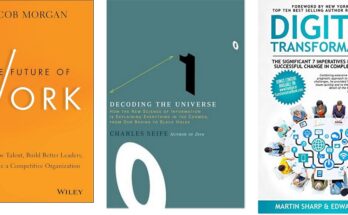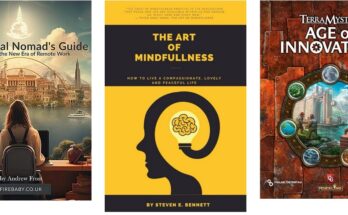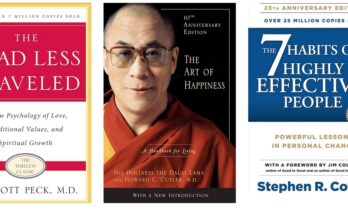


The Obstacle Is the Way" by Ryan Holiday vs Continuing further vs"The Power of Habit" by Charles Duhigg vs The Power of TED (The Empowerment Dynamic)" by David Emerald
The Obstacle Is the Way” by Ryan Holiday
Ryan Holiday’s “The Obstacle Is the Way” draws heavily from Stoic philosophy to argue that challenges and setbacks can be transformed into opportunities for growth and success. Inspired by Marcus Aurelius, Holiday presents the idea that perception, action, and will are the key components to overcoming obstacles.
Key Themes and Concepts:
- Perception: How we perceive obstacles determines our ability to handle them. By changing our perspective, we can turn obstacles into advantages.
- Action: Holiday emphasizes the importance of taking action regardless of the obstacles. He provides practical advice on how to maintain momentum.
- Will: The book highlights the importance of inner strength and resilience. By developing our willpower, we can endure and thrive despite difficulties.
Application: Holiday provides historical and contemporary examples of individuals who have successfully applied these principles. From Thomas Edison to Amelia Earhart, the book is filled with inspirational stories that illustrate how obstacles can be turned into triumphs.
Impact: “The Obstacle Is the Way” has become a popular resource for entrepreneurs, athletes, and leaders looking to harness the power of Stoic philosophy to overcome challenges.
“The Power of Habit” by Charles Duhigg
Charles Duhigg’s “The Power of Habit” delves into the science of habits and how they shape our lives. By understanding how habits work, we can learn to change them to improve our personal and professional lives.
Key Themes and Concepts:
- Habit Loop: Duhigg introduces the concept of the habit loop, which consists of a cue, routine, and reward. Understanding this loop is crucial to changing habits.
- Keystone Habits: Certain habits have the power to influence other areas of our lives. Identifying and focusing on these keystone habits can lead to significant improvements.
- The Science of Habits: The book explores the neurological and psychological aspects of habits, providing a scientific foundation for why we do what we do.
Application: Duhigg uses real-world examples from companies like Starbucks and Alcoa to demonstrate how changing habits can lead to business success. He also offers practical advice for individuals looking to change their own habits.
Impact: “The Power of Habit” has been influential in both personal development and business strategies. It provides readers with the tools to understand and change their habits, leading to more productive and fulfilling lives.
“The Power of TED (The Empowerment Dynamic)” by David Emerald
David Emerald’s “The Power of TED” presents a framework for transforming the way we approach challenges and relationships. It introduces the Empowerment Dynamic, which contrasts with the Dreaded Drama Triangle (DDT).
Key Themes and Concepts:
- Dreaded Drama Triangle (DDT): Emerald describes how people often fall into the roles of Victim, Persecutor, and Rescuer in conflict situations. These roles create drama and hinder progress.
- Empowerment Dynamic (TED): In contrast to DDT, the Empowerment Dynamic encourages individuals to adopt the roles of Creator, Challenger, and Coach. These roles foster empowerment and growth.
- Shift in Mindset: The book emphasizes the importance of shifting from a problem-oriented mindset to a creator-oriented mindset. This shift enables individuals to take control of their situations and create positive outcomes.
Application: Emerald provides practical exercises and examples to help readers apply the TED framework in their personal and professional lives. By adopting the roles of Creator, Challenger, and Coach, individuals can improve their relationships and achieve their goals.
Impact: “The Power of TED” has gained a following among individuals and organizations seeking to improve their conflict resolution and leadership skills. The book offers a simple yet powerful framework for transforming interactions and outcomes.
Table Comparison
| Aspect | “The Obstacle Is the Way” | “The Power of Habit” | “The Power of TED” |
|---|---|---|---|
| Author | Ryan Holiday | Charles Duhigg | David Emerald |
| Main Concept | Turning obstacles into opportunities | Understanding and changing habits | Transforming relationships and challenges |
| Philosophical Basis | Stoicism | Behavioral science | Psychological frameworks (DDT and TED) |
| Key Components | Perception, Action, Will | Cue, Routine, Reward (Habit Loop) | Creator, Challenger, Coach (Empowerment Dynamic) |
| Applications | Overcoming challenges in life and business | Personal and professional habit change | Conflict resolution, leadership improvement |
| Notable Examples | Thomas Edison, Amelia Earhart | Starbucks, Alcoa | Practical exercises for applying TED roles |
| Impact | Popular among entrepreneurs and leaders | Influential in personal development and business | Widely used for conflict resolution and leadership |
| Key Takeaway | Obstacles can be transformed into triumphs | Habits can be understood and changed | Shifting from drama to empowerment creates positive outcomes |
Conclusion
Each of these books offers unique insights and practical frameworks for improving different aspects of our lives:
- Ryan Holiday’s “The Obstacle Is the Way” teaches us to reframe challenges and use them as stepping stones to success, grounded in Stoic philosophy.
- Charles Duhigg’s “The Power of Habit” provides a scientific approach to understanding and changing our habits, with practical applications for both personal and professional growth.
- David Emerald’s “The Power of TED” introduces a transformative framework for improving our relationships and overcoming challenges by shifting from a drama-focused mindset to one of empowerment.
These books complement each other well, offering diverse strategies for personal development and growth. Whether you are looking to overcome obstacles, change habits, or improve your relationships, each book provides valuable tools and perspectives to help you achieve your goals.



